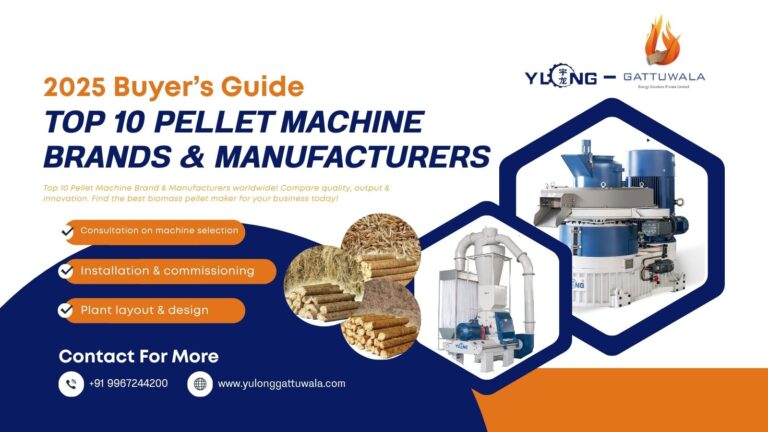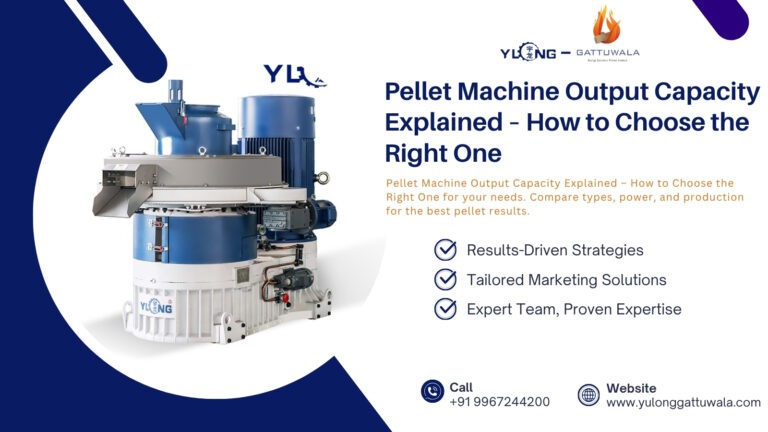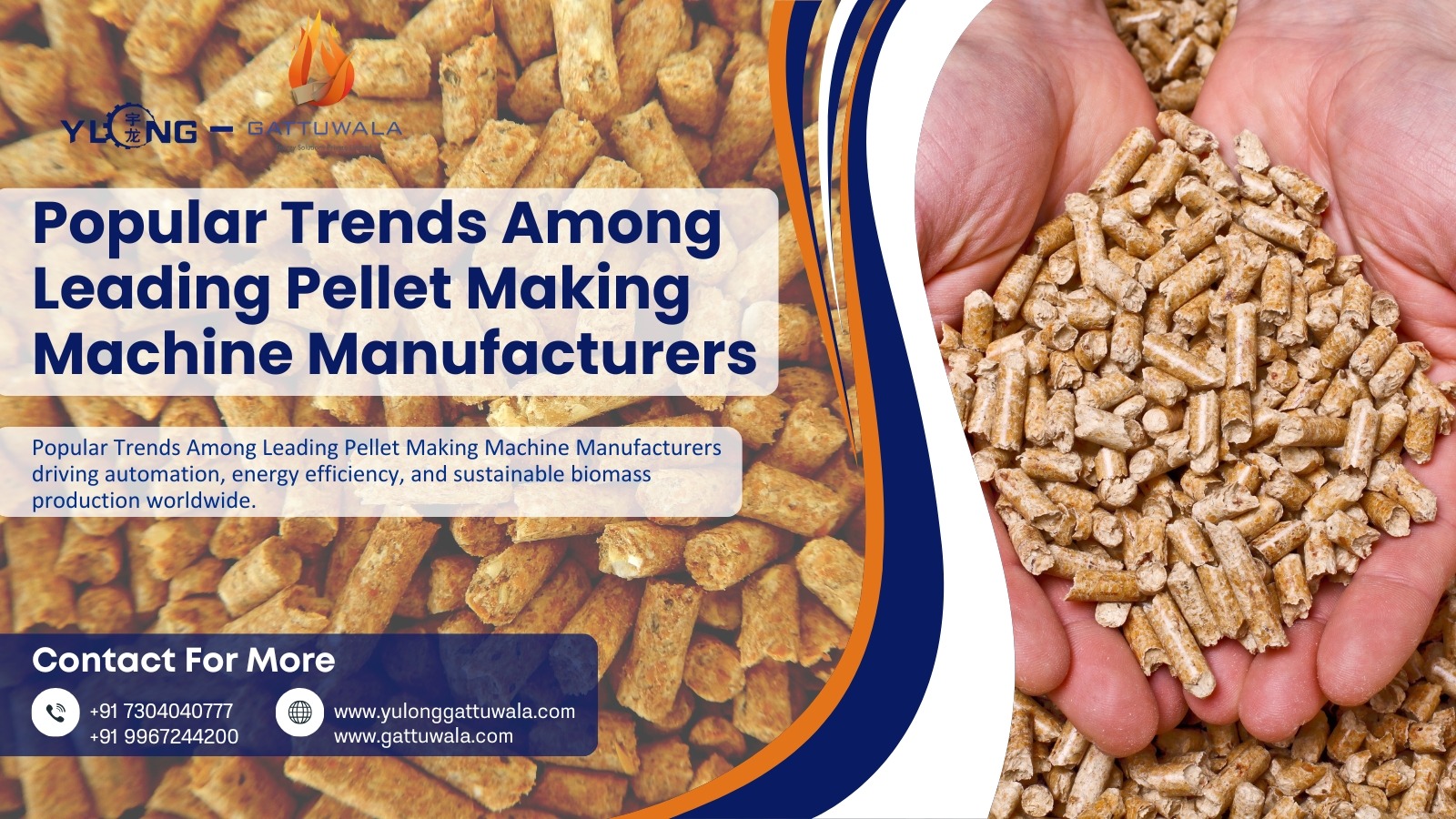- October 15, 2025
In recent years, the global demand for pellet making machines has risen dramatically, driven by the increasing shift toward renewable energy and sustainable waste management. From agricultural residues to wood chips, biomass pellets are becoming a preferred clean energy source worldwide. As a result, leading pellet machine manufacturers are adopting new technologies and practices to improve efficiency, performance, and sustainability. Let’s explore the popular trends shaping the pellet manufacturing industry in 2025.
One of the biggest trends in the pellet machinery industry is the integration of automation and digital control systems. Modern manufacturers like Yulong-Gattuwala, Andritz, and CPM are now incorporating PLC (Programmable Logic Control) systems that allow operators to monitor temperature, pressure, and moisture in real time.
These smart control systems ensure consistent pellet quality while reducing labor dependency and operational errors. The move toward Industry 4.0-based pellet plants has made production more efficient, reliable, and cost-effective.
2. Energy-Efficient Pellet Machines
Energy efficiency is another major trend. With rising power costs and environmental awareness, manufacturers are designing low-energy consumption pelletizers. The focus is on optimized die design, precision feeding systems, and efficient drive motors that minimize energy use per ton of pellets produced.
Companies like Yulong-Gattuwala lead in this area by offering pellet machines that produce 2–15 tons per hour with reduced electricity consumption and minimal maintenance needs. This not only lowers operating costs but also aligns with India’s renewable energy goals.
3. Use of Durable and Sustainable Materials
Durability and longevity have become key priorities. Manufacturers are using hardened steel dies, alloy rollers, and corrosion-resistant materials to ensure machines can handle abrasive agro residues and hardwood without frequent replacement.
This trend enhances reliability and uptime, particularly important for large-scale biomass pellet plants operating round-the-clock. In addition, eco-friendly lubricants and sustainable construction materials are being adopted to reduce the overall carbon footprint.
4. Customization for Different Raw Materials
Different countries and regions use varied raw materials like rice husk, sawdust, sugarcane bagasse, or forestry waste. Leading pellet machine brands now offer customized models designed for specific raw materials.
For instance, Yulong-Gattuwala’s pellet machines are optimized for Indian agro residues, ensuring higher output and longer die life. Such customization improves pellet quality and production efficiency, making it a vital trend for manufacturers serving global markets.
5. Compact and Modular Designs
Small and medium entrepreneurs are entering the biomass pellet industry, increasing the demand for compact, modular pellet plant designs. These machines are easy to install, operate, and relocate, offering scalability as production grows.
Modular systems can include integrated units such as hammer mills, dryers, pelletizers, and cooling systems. This plug-and-play approach allows faster setup and minimal space requirements, making biomass production feasible even in small facilities.
6. Sustainability and Carbon Neutral Operations
Sustainability is at the heart of every modern manufacturing trend. Pellet machine companies are focusing on carbon-neutral production, using renewable energy for operations and promoting zero-waste policies.
Yulong-Gattuwala, for example, supports farm waste recycling through biomass pellet technology—helping reduce stubble burning and air pollution in India. By converting agro waste into clean fuel, they contribute significantly to carbon emission reduction and a circular economy.
7. Global Collaboration and Innovation
Another growing trend is international collaboration between manufacturers and research institutes. This partnership accelerates innovation in die technology, pelletizing efficiency, and raw material utilization.
Chinese leaders like Yulong, in collaboration with Indian partners like Gattuwala Energy, are setting new benchmarks for quality, efficiency, and sustainability in biomass pellet production.
The future of the pellet machine manufacturing industry is bright, driven by automation, energy efficiency, and sustainability. As global demand for clean energy rises, manufacturers like Yulong-Gattuwala are leading the transformation by offering innovative, cost-effective, and eco-friendly pellet machinery solutions.
These evolving trends not only shape the market but also empower industries and farmers to turn waste into wealth—fueling India’s and the world’s journey toward a greener and more sustainable future.
📞 Interested in setting up a biomass pellet plant in India? Contact Gattuwala Energy for expert consultation, equipment, and government subsidy support.

Yulong-Gattuwala: Biomass Pellet Machine Manufacturer

Top 10 Pellet Machine Brands & Manufacturers – 2025


